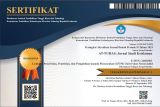The Relationship of Religion and State Law in Indonesia Paradigm Theory Perspective of the Relationship Between Religion and the State
(1) * Ahmad Musadad
 (Universitas Trunojoyo Madura)
(Universitas Trunojoyo Madura) Indonesia
(*) Corresponding Author
AbstractThe discourse on the relationship between religion and the state in the context of the implementation of Islamic law in Indonesia is an issue that will never go stale. This article aims to examine the relationship between Islamic law and state law from a paradigm theoretical perspective on the relationship between religion and the state, a study of the thoughts of Indonesian thinker Prof. Arskal Salim. The type of method used is qualitative, data comes from library materials, the main data is the book "Challenging the Secular State; The Islamization of Law in Modern Indonesia” by Prof. Dr. M. Arskal Salim GP, M.Ag. The data is read, analyzed, separated and categorized and then analyzed using descriptive analysis and content analysis. The research results show that Prof. Arskal Salim in his book raises five issues related to the dynamics and discourse of the relationship between religion and the state in the form of the application of Islamic law in state law in Indonesia. The five issues are the dialectic of the concept of sharia and the issue of the nation state, the dialectic of the formalization of Islamic law and the issue of nationalism, the implementation of Islamic law in the Pancasila state constitution, legislation and the formalization of Islamic law in national law, the formalization of Islamic law in Aceh from the beginning of independence to the reform era. Based on the theoretical analysis of the paradigm of relations between religion and the state, namely the integralistic, symbiotic and secularistic paradigms, a fourth new typology was discovered, namely symbiotic-integralistic which is a combination of the symbiotic and integralistic paradigms. This symbiotic paradigm applies throughout Indonesia, and the integralistic paradigm only applies in Nangroe Aceh Darussalam Province.
|
Keywords
Relation; Religious Law; State Law; Paradigm Theory.
Full Text: PDF
Refbacks
- There are currently no refbacks.
Copyright (c) 2023 Ahmad Musadad
This journal is licensed under a
Creative Commons Attribution-ShareAlike 4.0 International License





.png)






